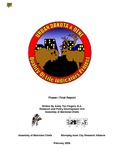| dc.description.abstract | The Assembly of Manitoba Chiefs (AMC) Research and Policy Development (RPD) Unit applied to the Winnipeg Inner-City Research Alliance (WIRA) to examine the urban experience of two of the First Peoples in central Canada – the Dakota, the Buffalo People of the Prairies, and the Dene, the Caribou Hunters of the Barrenlands. WIRA funded Phase I of this project to engage Dakota and Dene people in identifying and developing meaningful and appropriate Quality of Life (QOL) Indicators that accurately tell our story and experience of life in Winnipeg, Manitoba. This development will be facilitated by both Indigenous and Western research methodologies.
This report documents activity undertaken in Phase I of two phases in the overall project. Phase I involves the preliminary identification of QOL indicators and development of each an urban Dakota and Dene QOL survey. These activities and developments involved engaging, in total, eleven Dakota and twelve Dene people living in Winnipeg in six discussions each over the course of sixteen weeks. These preliminary indicators demonstrate that the uniqueness of these two First Nations cultural groups have a profound impact on their perspectives of their quality of life. | en_US |

